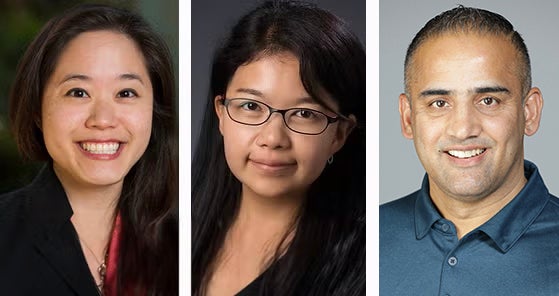UCR professors Rachel Wu, Eunsoo Cho, and Mahesh Raj Neupane have each received the Presidential Early Career Award for Scientists and Engineers, or PECASE, according to an announcement from The White House during the final days of the Biden administration.

The award is the highest honor bestowed by the U.S. government on outstanding early-career scientists and engineers.
“This award uniquely demonstrates an appreciation for the importance of science and technology from the highest level of the federal government,” said UCR Chancellor Kim Wilcox. “We are honored to have UCR faculty chosen as among those leading the way in creating a better society.”
Established by the Clinton administration in 1996, the award recognizes scientists and engineers who show exceptional potential for leadership, according to an NSF press release. Awardees this year are employed or funded by 14 federal agencies. Wu’s research has been funded by the National Science Foundation; Cho’s has been funded by the Department of Education.
Wu, an associate professor in the Department of Psychology, studies how infants and children learn, asking whether aspects of childhood learning can be applied to adult learning to maximize cognitive growth. She is a 2019 recipient of the NSF Career Award and has received several NSF grants. She received the 2023 Chancellor’s Award for Excellence in Undergraduate Research and Creative Achievement from UCR and the Innovative Research on Aging Silver Award from the Mather Institute.
Cho, an associate professor and Eady/Hendrick Chair of Learning Disability in the School of Education, works to help children overcome barriers to learning. Her research focuses on identifying cognitive and linguistic skills, motivational factors, and environments that shape reading development. She has created methods to measure how students improve when they receive reading instruction support, and she has designed instructional methods to help students who struggle with reading.
In 2016 and 2022, Cho received the Samuel A. Kirk Award from the Learning Disabilities Association of America (LDA) for the best research paper in the journal Learning Disabilities Research & Practice. She has received several research grants, including from LDA, Advanced Education Research and Development Fund, and the Institute of Education Sciences, as well as training grants from the Office of Special Education Programs.
Neupane is an assistant adjunct professor in the Department of Electrical and Computer Engineering and Materials Science and Engineering program in the Marlan and Rosemary Bourns College of Engineering. He studies novel materials by analyzing the behavior of individual atoms and how those materials can interface with radio frequencies (RF) and be applied to emerging electronics. He is also a Bourns alum, earning both a master’s degree and PhD in electrical engineering in 2012 and 2015, respectively.
Neupane serves as a program manager for the U.S. Army Combat Capabilities Development Command (DEVCOM) Army Research Laboratory’s (ARL) Army Research Office, managing its solid-state physics program. He also serves as a research scientist for the ARL’s Army Research Directorate, leading its Diamond Electronic Group’s materials and device modeling team.
Among other honors, Neupane has received a 2016 ARL Science Award, a 2017 ARL Customer Service Award, a 2020 Sensors and Electron Devices Directorate Diversity Award, a 2022 ARL Early Career Award, and a 2024 DEVCOM Army Research and Simulations-Analysis.